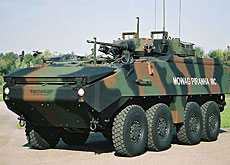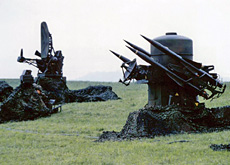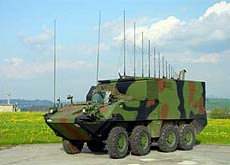Arms deal with Romania triggers controversy

The planned sale of Swiss-made armoured fighting vehicles to the Romanian army that will be used in Iraq has come in for criticism from all sides.
But according to the State Secretariat for Economic Affairs (Seco), there is nothing wrong with the destination or the material to be exported.
Seco and the Swiss foreign ministry approved last week the sale of 31 Piranha armoured vehicles to Romania produced by Swiss firm Mowag, as confirmed by the head of the company on Swiss television on Thursday.
Mowag, which is based in Kreuzlingen in northeastern Switzerland, is owned by the US defence giant General Dynamics.
The news magazine Jane’s Defence Weekly also confirmed the deal, adding that Romania plans to use the vehicles in Iraq and Afghanistan.
Romania, which is a member of Nato and the European Union, currently has around 860 troops in the Middle East as part of the coalition forces and 550 soldiers in Afghanistan, under Nato command.
According to the Swiss television news, the Romanians have already put their plans in writing. The total arms deal is worth SFr62 million ($51.44 million).
No problem
The export of arms and weapons components is subject to approval by the Swiss authorities and sales of war materiel are forbidden to countries involved in a conflict.
Lars Knuchel, foreign ministry spokesperson, refused to comment on the deal, adding that Seco was responsible for the decision.
“These armed vehicles will go to Romania with whom Switzerland has a clear relationship,” he told swissinfo though. “Legally, therefore, there is nothing to oppose such a deal.”
Seco also refused to go into the details.
“All legal conditions have been met by Romania, which belongs to Nato and the EU and is not a country at war,” noted Rita Baldeger, Seco’s spokeswoman.
“This material is intended to protect Romanian soldiers taking part in the pacification of Iraq and Afghanistan and not for attacking the civilian population,” she said.
Under attack
But the sale has met with criticism in political circles.
Luzi Stamm, president of the House of Representatives’ foreign affairs committee, told Swiss television that neutrality was much too valuable to be risked in such a way.
The rightwing People’s Party parliamentarian hopes that the committee will look into the affair and stop it in its tracks.
Centre-left Social Democrat parliamentarian Mario Fehr was also sceptical: “It’s unacceptable that Swiss weapons end up in Iraq.”
The lobby group Switzerland without an Army said it was “revolted” by the news and urged government “to put an end to the project”.
Tank trouble
Switzerland’s arms-export policies have not been without controversy in the past.
In June 2005 the Swiss cabinet approved the sale of 180 used armoured personnel carriers to Iraq via the United Arab Emirates (UAE) for SFr12 million but suspended the sale in August, following reports that the vehicles would not be used for civilian purposes. In October the UAE cancelled the deal because of the delay.
The Swiss government had wanted guarantees that the vehicles would be deployed for civilian purposes.
The UAE said the unarmed tanks would be given free to Iraq to boost efforts by police but it was reported that the armoured carriers would be used by Iraqi troops.
Days after Switzerland suspended the sale, Swiss arms-export policy was thrown into disarray when it was revealed that 40 tanks sold to the UAE in 2004 had been sent to Morocco in a clear breach of the end-user certificate.
swissinfo with agencies
In Switzerland war materiel is subject to a law which forbids any sale by the government to countries involved in conflict. But for private companies the rules are less stringent.
The legislation covers arms systems, ammunition and explosives as well as other material used for combat training.
Checks and controls on arms deals are made by the administrative authorities (Seco), the cabinet and a parliamentary committee.
77.5% of Swiss citizens rejected a people’s initiative to ban the export of war material in June 1997.
In 2006 Switzerland exported arms and military material worth SFr397.6 million to 62 countries (2005: SFr258.7 million; 2004: SFr402 million), representing 0.21% of overall Swiss exports.
Europe: 71% of exports; United States: 22%; Asia: 5%; Africa: 1% and Australia: 0.4%.
The main importing countries were: Denmark (SFr111 million), Germany (SFr56 million), US (SFr53 million) and Chile (SFr35 million).
The Swiss company Mowag is part of the US defence giant General Dynamics.
Mowag produces armoured wheeled vehicles for military use, such as the Piranha, Eagle and Duro series, which are used by many armed forces worldwide.
The company employs more than 600 people at its Kreuzlingen site.
General Dynamics, which makes the Abrams tank, submarines, guns and battlefield communications systems, employs 81,000 people worldwide and in 2006 had income of $24.1 billion.

In compliance with the JTI standards
More: SWI swissinfo.ch certified by the Journalism Trust Initiative












You can find an overview of ongoing debates with our journalists here . Please join us!
If you want to start a conversation about a topic raised in this article or want to report factual errors, email us at english@swissinfo.ch.